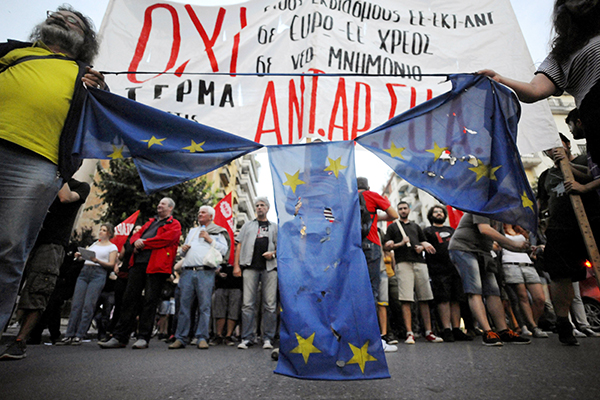Greece's Tsipras digs in against bailout
(Agencies) Updated: 2015-07-02 07:17SCEPTICISM
 |
|
Anti-EU protesters hold a burned and torn European Union flag during a protest at the northern city of Thessaloniki, Greece July 1, 2015. A defiant Prime Minister Alexis Tsipras urged Greeks on Wednesday to reject an international bailout deal, wrecking any prospect of repairing broken relations with EU partners before a referendum on Sunday that may decide Greece's future in Europe. [Photo/Agencies] |
The Tsipras letter asking for a new bailout deal appeared to move closer to accepting creditor demands. But it contained only a single sketchy reference to labour market reform and no mention at all of frozen privatisations, both big priorities for the creditors.
He asked to keep a discount on value-added tax for Greek islands, stretch out defence spending cuts and delay the phasing out of an income supplement to poorer pensioners.
The lack of panic in financial markets stood in marked contrast to 2011, when the Greek crisis was perceived as a threat to the future of the single currency and investors bid up the borrowing costs for other countries seen as being in danger, like Spain and Italy. Most euro zone leaders now believe any damage to the currency zone from Greek turmoil can be contained.
In a poll by the ProRata Institute published in the Efimerida ton Syntakton newspaper, 54 percent of Greeks planning to vote would oppose the bailout against 33 percent in favour.
Of those polled before the announcement of the bank closures, 57 percent said they would vote "No" against 30 percent who would vote "Yes". However among those polled after, the "No" camp fell to 46 percent against 37 percent for "Yes".
Seeking a "No" vote, Varoufakis told state television a deal would then swiftly follow, even as early as Monday, and the capital controls would go.
"The ECB will press the button," he said.






